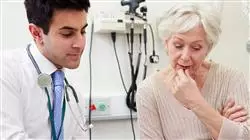University certificate
The world's largest faculty of medicine”
Introduction to the Program
Developments that have enhanced work capacity and outcomes of people with cognitive impairment in Rehabilitation Medicine are compiled in a high-impact educational program”

In geriatrics, rehabilitation medicine professionals often work with approaches of people with cognitive impairment. This field of work, so relevant and in constant renovation, is nourished by the advances and updates that are appearing and being incorporated to the praxis. Keep their skills current is essential for doctors in this field to improve patient's quality of life.
To do this, professionals must assess and explore the patient's resistance and physiological reserves in order to establish the appropriate framework for action, home care, residential care, day care centers, social centers or private clinics.
It is therefore essential to know the tools of physiotherapy and the appropriateness of its application in each case, such as active exercise, manual therapy, electrotherapy being able to work in interdisciplinary team, with appropriate communication tools; understanding the concept of person-centered care, having the most up-to-date knowledge of support devices and even the support of current technology can be key to success in physiotherapy treatment.
An intensive course that will give students the most up-to-date knowledge, which will allow them to work on maintaining their mental capacity for as long as possible or to improve their condition”
This Postgraduate certificate in Rehabilitation Medicine Approach of Persons Affected by Cognitive Impairment contains the most complete and up-to-date scientific program on the market. The most important features include:
- The development of practical cases presented by experts in Geriatric Rehabilitation Medicine
- The graphic, schematic, and practical contents with which they are created, provide scientific and practical information on the disciplines that are essential for professional practice
- Practical exercises where self-assessment can be used to improve learning
- Its special emphasis on innovative methodologies
- Theoretical lessons, questions to the expert, debate forums on controversial topics, and individual reflection assignments
- Content that is accessible from any fixed or portable device with an Internet connection
A comprehensive study into the different pathologies and situations for intervention in rehabilitation medicine for patients with mental disorders”
The program includes, in its teaching staff, professionals from the sector who bring to this program experience from their work, in addition to recognized specialists from prestigious reference societies and universities.
Its multimedia content, developed with the latest educational technology, will provide professionals with situated and contextual learning, i.e., a simulated environment that will provide an immersive training designed to train for real situations.
This program is designed around Problem-Based Learning, whereby professionals must try to solve the different professional practical situations that arise throughout the program. For this purpose, students will be assisted by an innovative interactive video system created by renowned experts.
A methodological approach based on proven teaching techniques to allow students to learn in a dynamic and effective way"

With the support of high-quality audiovisual systems, the purpose of this Postgraduate certificate is that students not only acquire the knowledge, but that, upon completion, students possess the working skills needed in this field"
Why study at TECH?
TECH is the world’s largest online university. With an impressive catalog of more than 14,000 university programs available in 11 languages, it is positioned as a leader in employability, with a 99% job placement rate. In addition, it relies on an enormous faculty of more than 6,000 professors of the highest international renown.

Study at the world's largest online university and guarantee your professional success. The future starts at TECH”
The world’s best online university according to FORBES
The prestigious Forbes magazine, specialized in business and finance, has highlighted TECH as “the world's best online university” This is what they have recently stated in an article in their digital edition in which they echo the success story of this institution, “thanks to the academic offer it provides, the selection of its teaching staff, and an innovative learning method aimed at educating the professionals of the future”
A revolutionary study method, a cutting-edge faculty and a practical focus: the key to TECH's success.
The most complete study plans on the university scene
TECH offers the most complete study plans on the university scene, with syllabuses that cover fundamental concepts and, at the same time, the main scientific advances in their specific scientific areas. In addition, these programs are continuously being updated to guarantee students the academic vanguard and the most in-demand professional skills. In this way, the university's qualifications provide its graduates with a significant advantage to propel their careers to success.
TECH offers the most comprehensive and intensive study plans on the current university scene.
A world-class teaching staff
TECH's teaching staff is made up of more than 6,000 professors with the highest international recognition. Professors, researchers and top executives of multinational companies, including Isaiah Covington, performance coach of the Boston Celtics; Magda Romanska, principal investigator at Harvard MetaLAB; Ignacio Wistumba, chairman of the department of translational molecular pathology at MD Anderson Cancer Center; and D.W. Pine, creative director of TIME magazine, among others.
Internationally renowned experts, specialized in different branches of Health, Technology, Communication and Business, form part of the TECH faculty.
A unique learning method
TECH is the first university to use Relearning in all its programs. It is the best online learning methodology, accredited with international teaching quality certifications, provided by prestigious educational agencies. In addition, this disruptive educational model is complemented with the “Case Method”, thereby setting up a unique online teaching strategy. Innovative teaching resources are also implemented, including detailed videos, infographics and interactive summaries.
TECH combines Relearning and the Case Method in all its university programs to guarantee excellent theoretical and practical learning, studying whenever and wherever you want.
The world's largest online university
TECH is the world’s largest online university. We are the largest educational institution, with the best and widest online educational catalog, one hundred percent online and covering the vast majority of areas of knowledge. We offer a large selection of our own degrees and accredited online undergraduate and postgraduate degrees. In total, more than 14,000 university degrees, in eleven different languages, make us the largest educational largest in the world.
TECH has the world's most extensive catalog of academic and official programs, available in more than 11 languages.
Google Premier Partner
The American technology giant has awarded TECH the Google Google Premier Partner badge. This award, which is only available to 3% of the world's companies, highlights the efficient, flexible and tailored experience that this university provides to students. The recognition as a Google Premier Partner not only accredits the maximum rigor, performance and investment in TECH's digital infrastructures, but also places this university as one of the world's leading technology companies.
Google has positioned TECH in the top 3% of the world's most important technology companies by awarding it its Google Premier Partner badge.
The official online university of the NBA
TECH is the official online university of the NBA. Thanks to our agreement with the biggest league in basketball, we offer our students exclusive university programs, as well as a wide variety of educational resources focused on the business of the league and other areas of the sports industry. Each program is made up of a uniquely designed syllabus and features exceptional guest hosts: professionals with a distinguished sports background who will offer their expertise on the most relevant topics.
TECH has been selected by the NBA, the world's top basketball league, as its official online university.
The top-rated university by its students
Students have positioned TECH as the world's top-rated university on the main review websites, with a highest rating of 4.9 out of 5, obtained from more than 1,000 reviews. These results consolidate TECH as the benchmark university institution at an international level, reflecting the excellence and positive impact of its educational model.” reflecting the excellence and positive impact of its educational model.”
TECH is the world’s top-rated university by its students.
Leaders in employability
TECH has managed to become the leading university in employability. 99% of its students obtain jobs in the academic field they have studied, within one year of completing any of the university's programs. A similar number achieve immediate career enhancement. All this thanks to a study methodology that bases its effectiveness on the acquisition of practical skills, which are absolutely necessary for professional development.
99% of TECH graduates find a job within a year of completing their studies.
Postgraduate Certificate in Rehabilitation Medicine Approach of Persons Affected by Cognitive Impairment
The Postgraduate Certificate in Approach from the Rehabilitative Medicine of the Person Affected by Cognitive Deterioration is a unique opportunity for those health professionals who work in the field of geriatrics and find themselves in the approach of people with cognitive impairment. This field of work, so relevant and in constant renewal, requires a constant updating of the professional's skills to achieve the improvement of the patients' quality of life. The course program is designed to provide health professionals with the necessary tools to approach cognitive impairment in the elderly from the point of view of rehabilitative medicine. Students will learn to assess and explore the patient's physiological reserves in order to establish the appropriate framework for action in each case, whether in home care, residential centers, day centers or private clinics. In addition, the program addresses topics such as physiotherapy in the treatment of cognitive impairment, interdisciplinary communication tools, the concept of person-centered care and current support devices and technology available on the market.
Update your knowledge in rehabilitation medicine
The Postgraduate Certificate Course in Approach from Rehabilitative Medicine of the Person Affected by Cognitive Deterioration is taught by experts in the field of geriatrics and rehabilitative medicine, with a wide experience in research and clinical practice. In addition, the practical approach of the course allows students to apply the knowledge acquired in real healthcare situations. In summary, if you are a health professional interested in improving your skills in the approach to cognitive impairment in the elderly, the Postgraduate Certificate in Rehabilitative Medicine Approach to the Person Affected by Cognitive Deterioration is the ideal option for you. Do not miss the opportunity to update your knowledge and offer your patients the best possible care.







